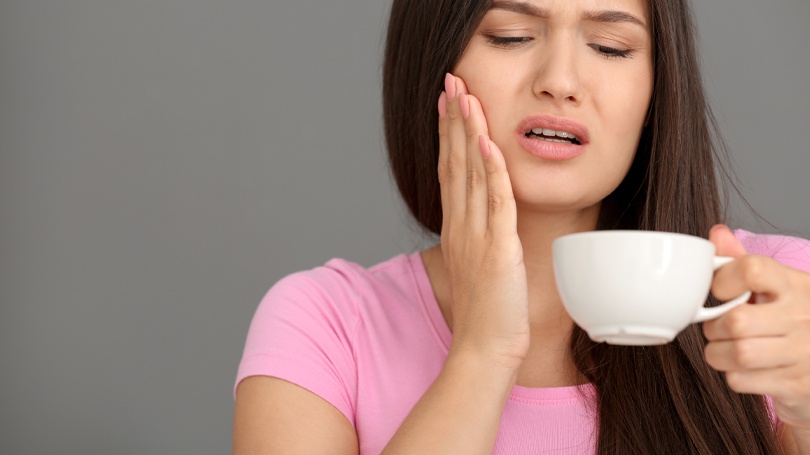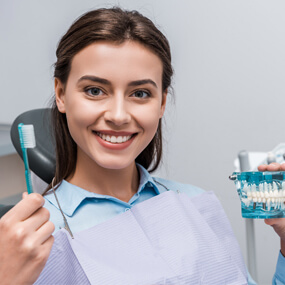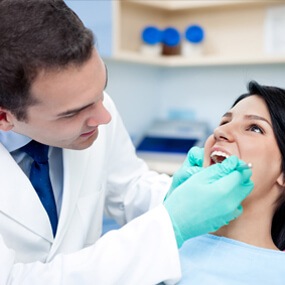Sensitive Teeth: Causes and Treatments

Some people are naturally more sensitive than others when it comes to their teeth. But sensitive teeth are often an indication of worn tooth enamel or even tooth decay. The Academy of General Dentistry estimates that about 40 million Americans suffer from sensitive teeth. In that spirit, let us consider what causes sensitive teeth and whether you should schedule a visit with your dentist.
Understanding Teeth Hypersensitivity
Your teeth are mostly made of a substance called dentin, which contains many tiny nerves that are housed in microscopic tubules. Those nerves are sensitive and so have to be protected. Your enamel is the hard, outer shell that forms the crown, which protects much of the dentin. The dentin also extends all the way to the root, and it is protected by the cementum in that lower area. Hypersensitivity occurs when either the enamel or cementum is compromised, thus exposing the nerve endings in the dentin. This is what causes discomfort when you eat or drink something hot, cold, acidic, or sweet.
Risk Factors for Sensitive Teeth
There are several activities and conditions that can lead to sensitive teeth or heightened sensitivity. Some of these situations, like tooth decay, are obvious, but others are less apparent. Most cases of hypersensitivity happen over time for various reasons, including:
- Brushing too often or too hard—You should brush gently with a soft-bristled brush two times a day and for about two minutes each time. If your bristles are too hard, or you brush too often, you can irritate the gums, which in turn exposes root surfaces, thereby causing sensitivity.
- Plaque accumulation—By not brushing properly or enough on a regular schedule, plaque and food particles then build up and eventually become calcified tartar. This causes gum inflammation, which in turn causes bleeding gums and recession of the gum tissue. Root surfaces then become exposed, which causes sensitivity.
- Gum disease—Infected gums become inflamed. Tissues become sore and even painful. Eventually, connective tissues and bone deteriorate, which can lead to the teeth themselves being more sensitive.
- Damaged teeth—Teeth that are chipped, cracked, or otherwise damaged can expose the tooth root. Cracks can also provide an access point through which oral bacteria can reach the tooth pulp.
- Tooth decay—Cavities expose the dentin and deeper aspects of a tooth. This leads to sensitivity with certain foods and drinks and even when breathing in cold air.
- Bruxism—Bruxism is a condition that causes jaw clenching and teeth grinding. People with sleep bruxism are often unaware of the problem without realizing it. Over time, this undue pressure can wear your tooth enamel and expose your dentin.
- Teeth whitening—Over-the-counter teeth whitening products are notorious for causing sensitivity, which is why you should always opt for dentist-supervised whitening. In addition, toothpaste with baking soda and peroxide can cause sensitivity, so it should be used occasionally rather than regularly.
- Age—You are more prone to hypersensitivity as you age and your enamel wears. However, it is more common in females, and it tends to peak between 30 and 40 years old regardless of gender.
- Abrasive mouthwash—Many commercial oral rinses contain acids that can contribute to the wearing of your enamel over time. To avoid issues with sensitivity, choose a nonacidic, non-alcoholic mouthwash and use it in moderation, such as no more than twice a day.
- Acidic beverages and foods—Beverages high in acids, including carbonated drinks, certain teas, and citrus fruit juices, can damage your enamel. A diet high in acids can lead to dentin hypersensitivity as well.
- Routine dental treatments—Certain routine dental procedures can cause temporary sensitivity. These treatments include teeth cleaning, oral restorations, and root planing. If sensitivity persists beyond six weeks, consult with your dentist.
Reducing Your Sensitivity
Managing your sensitivity starts with good oral hygiene. You should brush once in the morning after breakfast and again before you go to bed. You should floss daily, and you should consider the following points:
- Use a soft-bristled brush. Use as soft as you need to feel comfortable. Be gentle. Replace your brush with a new one about every three months or whenever it shows signs of wear.
- Use a fluoridated toothpaste and consider other fluoridated dental products. Look for the ADA Seal of Acceptance on all products. Use baking soda and peroxide-based products sparingly.
- Balance your diet. Avoid beverages high in acids and sugars. Balance acidic meals. Ensure that you are getting the recommended daily allowances for teeth- and gum-friendly nutrients.
- Visit your dentist at least every six months. Be proactive. Avoid waiting for dentin hypersensitivity or some other oral health issue to happen before you go to the dentist.
The Sooner the Better
If you notice a change in how sensitive your teeth are, you should schedule an appointment with your dentist as soon as possible. Talk to your dentist about when the discomfort started, how bad the pain is, and anything you do that makes it feel better or worse. Your dentist will diagnose the underlying cause and then recommend a treatment. Your sensitivity may be corrected by treating a cavity, replacing an old filling, strengthening the enamel with an in-office treatment, or adjusting your at-home care. In more serious cases, your dentist may recommend a gum graft in order to protect your tooth roots.
Find Relief for Your Sensitive Teeth
If you have been suffering from painful sensitivity that keeps you from the foods you love, schedule an appointment at Scottsdale Cosmetic Dentistry Excellence today. Jeffrey D. Clark, DDS, is a leading dentist in the Greater Scottsdale area who has helped many patients overcome dentin hypersensitivity. Dr. Clark offers a wide range of modern restorative and cosmetic treatments and can advise you on your at-home oral care as well. Call 480 585 1853 with any questions you may have and to make your appointment.




